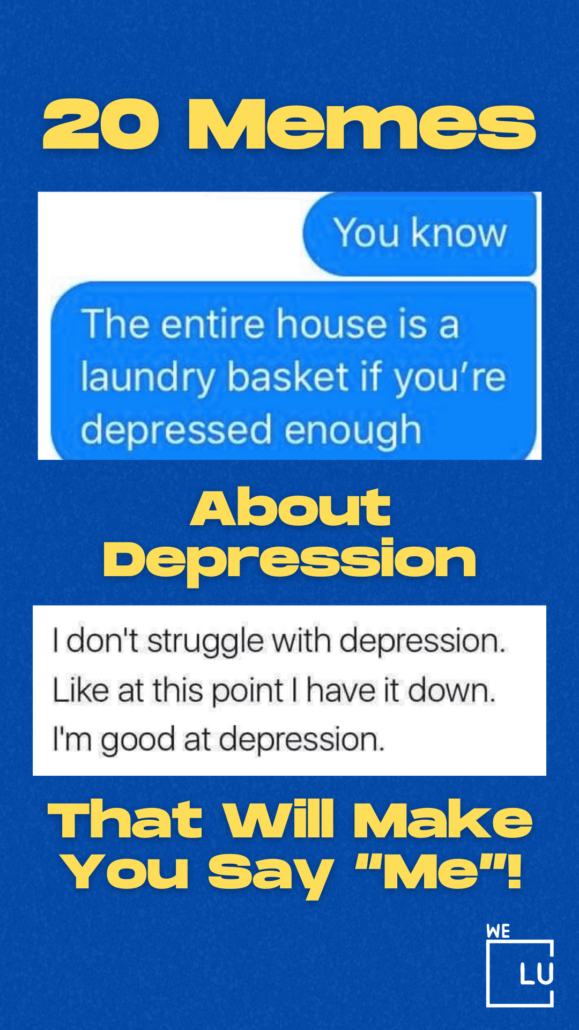The battle with anxiety and depression is a continual fight that tests a person's endurance and resilience. In spite of having a solid community of support, the help of antidepressant medications, the assistance of a committed therapist, and some depression memes & the daily experience of these issues can be incredibly difficult. This is particularly true when anxiety and depression are co-existing, forming a powerful one-two punch that makes the simplest tasks feel overwhelming. Recognizing the challenges of managing these two conditions is crucial to discover strategies for coping and finding moments of calm.
The challenges of depression:
Depression casts a dark shadow over our lives, zapping motivation and energy even the most basic activities. Simple tasks like getting up of your bed, taking a shower, or preparing meals can turn into difficult and daunting tasks. The feelings of sadness, emptiness and despair continue to linger which makes it hard to find enjoyment in previously cherished activities or to interact with other people. The ability to concentrate and make decisions can become difficult, making it more difficult to complete tasks or take on responsibilities.
The Weight of Anxiety:
Anxiety, which is a frequent companion to depression for numerous people, adds additional burden to the everyday struggle. Insomnia and worry are a constant source of stress, leading to a constant feeling of unease and anxiety. Anxiety manifests in physical symptoms such as rapid sweating, heartbeat, and breathlessness, exacerbating feelings of distress. Everyday activities can become a nightmare due to anxiety that magnifies perceived risks, and can increase anxiety about the dangers that are imminent.
The One-Two Punch:
The combination of depression and anxiety creates a vicious cycle that intensifies the challenges faced by individuals. Anxiety is a source of self-doubt that amplifies negative thoughts, increasing the negative effects of depression. Additionally, depression can reduce motivation and erode coping mechanisms, leaving individuals more susceptible to anxiety triggers. The cumulative effects of these issues can leave you feeling that every aspect of life is an uphill battle.
Strategies for Coping with Daily Life:
While navigating the challenges of anxiety and depression may be daunting, there are strategies that can help individuals find relief and feel a sense of control:
Self-care: Make it a priority to do self-care that include ensuring a regular sleep schedule or engaging in physical exercise, and nourishing the body with nutritious food. Little acts of self-care could be beneficial to general well-being.
Break down tasks into smaller steps If you are faced with overwhelming tasks, break them down into manageable chunks. Focus on one step at a time, rewarding yourself for each achievement on the journey.
Support Get support from your network, be it family members, friends or support groups. Tell your story and ask for help if you need it. Sharing your experiences with other people who understand can provide comfort and validation.
Do some mindfulness training: Use mindfulness techniques, such as deep breathing exercises, meditation or techniques for grounding. These exercises can help soothe the mind and lower the effects of anxiety and depressive thoughts.
Make sure you are mindful of negative self-talk and challenge these thoughts with the use of evidence-based reasoning. Cognitive-behavioral therapy are helpful in identifying and reframing negative thinking patterns.
Set realistic expectations: Adjust expectations and be kind to yourself. Accept that some days are going to be more challenging than others. It's ok to take breaks and ask for assistance.
Celebrate small victories: Acknowledge and celebrate the smallest successes. Accept that progress is slow and that every step, no matter how tiny, is important.
Conclusion:
The everyday experience of depression and anxiety could be a challenging journey even with a solid support system, professional help, and medication. Being aware of the dual nature of these overlapping conditions is essential to come up with efficient strategies for coping. By incorporating self-care, getting help, and employing methods to overcome negative thoughts, people are able to gradually gain control of their lives. By focusing on perseverance, resilience and the right tools, it's possible to find times of relaxation and begin to build an avenue to recovery. Remember, you are not in isolation, and there is optimism for brighter times ahead.
Also read: memes about anxiety

